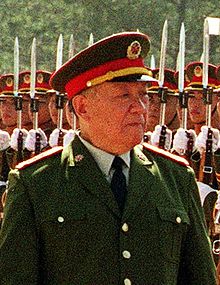Chi Haotian
This biography of a living person needs additional citations for verification. (March 2013) |
General Chi Haotian | |
|---|---|
迟浩田 Chih Hao-tien | |
 | |
| Vice Chairman of the Central Military Commission | |
| In office Party Commission: 28 September 1995 – 15 November 2002 State Commission: 28 March 1993 – 5 March 2003 | |
| Chairman | Jiang Zemin |
| 8th Minister of National Defense | |
| In office March 1993 – 17 March 2003 | |
| Premier | Li Peng Zhu Rongji |
| Preceded by | Qin Jiwei |
| Succeeded by | Cao Gangchuan |
| Personal details | |
| Born | 9 July 1929 Zhaoyuan, Shandong, China |
| Political party | Communist Party of China |
| Military service | |
| Allegiance | |
| Branch/service | |
| Years of service | 1946–2003 |
| Rank | |
Chi Haotian (simplified Chinese: 迟浩田; traditional Chinese: 遲浩田; pinyin: Chí Hàotián; born 9 July 1929), also spelled as Chih Hao-tien is a retired general of the Chinese People's Liberation Army. He served as Minister of National Defence from 1993 to 2003.
Biography[]
Chi was born 9 July 1929 in Zhaoyuan, Shandong, Republic of China. In October 1946 he joined the CPC (Communist Party of China). He was recruited to the army in July 1945, and graduated from the synthesis department of Military Academy of PLA.
In 1973, he became the vice political commissar of Beijing Military Region, and vice editor in chief of a prominent newspaper "People's Daily". He later became vice director of the general staff department of PLA and the director of political department under it, the political commissar of Jinan Military Region, and the head of the general staff department of PLA as well as the secretary of CPC's committee there. He was elected as a member of central military commission in 1988.
In May and June 1989, Chi played an important role in directing the military's enforcement of martial law in Beijing to suppress the Tiananmen Square Protests in the national capital. As chief of staff he instructed the commanding officers of the Beijing, Shenyang, and Jinan Military Districts to "finalize the name list of every group army division scheduled to advance into Beijing and their exact times of departure and arrival, as well as details regarding primary duties", according to the "Daily report" (Meiri yibao) from the Central Military Commission Office, dated 19 May 1989. This military buildup resulted in the so-called Beijing massacre, which took place on 4 June that year.
In 1993 Chi became a state council member and the Minister of National Defense until 2003. He was also the director of the Law of National Defense Draft Commission. He was elected to be vice chairman of the central military commission of the CPC in September 1995, and CMC of the state in December that year. On 19 October 1999, after meeting with Syrian Defence Minister Mustafa Tlass in Damascus, Syria, to discuss expanding military ties between China and Syria, Chi then flew directly to Israel and met with Ehud Barak, the then prime minister and Defence Minister of Israel where they discussed military relations. Among the military arrangements, was a 1 billion dollar Israeli Russian sale of military aircraft to China, which were to be jointly produced by Russia and Israel.[1]
He was elected as a member of central committee of CPC's 12th, 13th, 14th and 15th National Congresses, and a Politburo member at 15th Congress. He was awarded First-class honor in 1952, and Third-Class Liberation medal in 1985. He was made general in 1988.
References[]
- ^ "China defense minister visits Israel". Archived 30 May 2012 at the Wayback Machine World Tribune. Thursday, 21 October 1999
External links[]
- 1929 births
- Living people
- Ministers of National Defense of the People's Republic of China
- People's Liberation Army generals from Shandong
- Politicians from Yantai
- Chinese Communist Party politicians from Shandong
- People's Republic of China politicians from Shandong
- People's Liberation Army Chiefs of General Staff
- Members of the 15th Politburo of the Chinese Communist Party
- State councillors of China